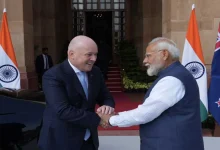Why Pakistan’s Army Chief Asim Munir May Be Provoking a Limited War with India

New Delhi: Following the devastating April 22 terror attack in Pahalgam, where 26 people — mostly tourists — were brutally gunned down, India’s top leadership has vowed a decisive response. The Resistance Front, a proxy of the Pakistan-based Lashkar-e-Taiba (LeT), claimed responsibility for the attack. According to intelligence inputs, Saifullah Kasuri, a senior LeT commander, orchestrated the massacre.
Prime Minister Narendra Modi, addressing a public rally in Bihar, promised to hunt down every terrorist and their supporters. Notably, he switched from Hindi to English mid-speech — a rare move aimed at sending a stern message to the global community: India will respond.
Meanwhile, Pakistani military assets have reportedly repositioned closer to the Indian border, a signal that Islamabad anticipates retaliation. However, full-scale war between the two nuclear-armed neighbours remains unlikely — though a limited military conflict cannot be ruled out.
ASIM MUNIR’S RISING UNPOPULARITY IN PAKISTAN:
General Asim Munir, Pakistan’s Army Chief, is reportedly grappling with eroding public trust and growing unrest across the country. The military’s grip is weakening amid intensifying insurgencies in Balochistan and Khyber-Pakhtunkhwa, civil protests in Sindh over development projects, and outrage in Punjab following the imprisonment of former PM Imran Khan.
Former J&K DGP S.P. Vaid noted, “General Munir is seeking escalation to rebuild credibility.” Defence analyst Col. Rohit Dev (Retd) told India Today that Munir is playing the Kashmir card as a unifying narrative while domestic dissatisfaction surges. “He can’t even move through parts of Pakistan safely,” Dev added.
The Pakistan Army, once a respected institution, now faces visible public anger. For the first time, analysts say, the military lacks overwhelming civilian support — even during heightened tensions with India.
WHY ASIM MUNIR WANTS INDIA TO STRIKE BACK:
Pakistan’s economy is already in dire straits, surviving on an IMF bailout and international aid. Yet, Munir has kept the military budget untouched. Analysts suggest that provoking a limited Indian strike could rally a divided nation around its military once again — a tactic reminiscent of Pervez Musharraf’s crisis strategy in the mid-2000s.
Pakistan’s stock market tanked after PM Modi’s warning, with the KSE-100 dropping over 1,000 points. Still, Munir appears to prioritize restoring the Army’s domestic stature over economic stability. His recent speech — laden with anti-Hindu sentiment and aggressive rhetoric on Kashmir — was seen as a calculated appeal to nationalist emotions.
Former Pakistani minister Chaudhry Fawad Hussain echoed the effect of this strategy, declaring: “If attacked by India, all political factions will unite under one flag.”
Strategic affairs expert Michael Kugelman told The Guardian that India has both “diplomatic and kinetic options” on the table. Meanwhile, U.S. reaction suggests potential quiet backing of an Indian response — similar to the global sentiment after Pulwama.
As military planners in New Delhi weigh their options, one thing is clear: any counterstrike must be calculated to punish the perpetrators without inadvertently bolstering General Munir’s failing standing. In military doctrine, there is no room for revenge — only precision countermeasures.
Quoting Chinese strategist Sun Tzu, experts caution: “The greatest victory is that which requires no battle.”




